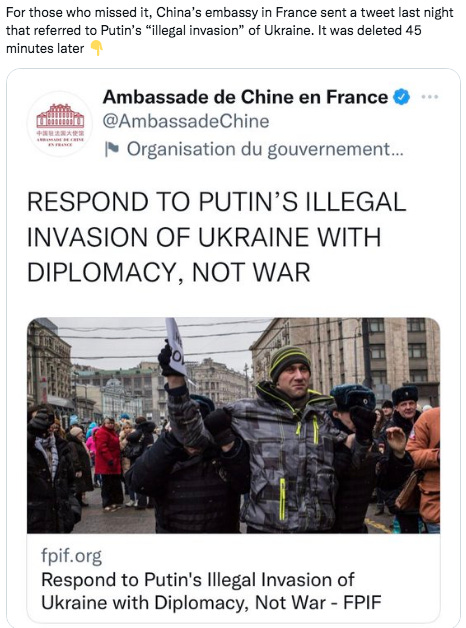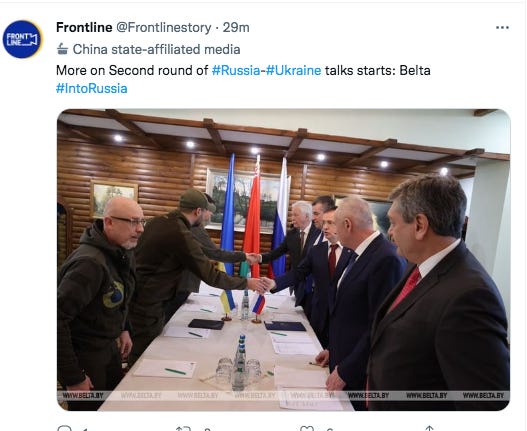Russia failure to seize Ukraine immediately, the same doubt in Beijing what happened one day about (axis) U.S. - Taiwan
FRONTLINE, a newest division of CGTN (Chinese Government media), really rocketing influence amid the Winter Olympic and Russia Ukraine war. Like Aljazeera on Iraq 2003 and (Brutal Invasion) Israel to Palestine 2006, popularity of FRONTLINE is really high, even (till this op-ed has written) still not yet get a verified Blue-Check by Twitter.
Using controversy of Eileen Gu in Winter Olympics, and then Russia war/invasion to Ukraine, FRONTLINE try to give a perspective different. Even, this name really means to Beijing: “The Frontline” to facing the West.
But, China itself is facing several dilemma. Not only FRONTLINE.
Pacifying Taiwan would be an immense challenge for the PLA, and the Taiwanese can make that threat all the more formidable by receiving proper training, being given access to weapons and by preparing the population to ... [wage] asymmetrical resistance." Like Ukraine (only 44 million inhabitants, and even begged foreigners to join), integrated the continent directly with Russia, until 171 hours after Putin started a war, and until 2nd meet Ukraine-Russia (in border or Poland-Belarus), Kyiv still intact under Zelensky. How happy are several high ranking elite in Taipei on Kyiv situation, because the “Ukraine model” really inspires Taiwan to face entirely China PLA soldiers.
China likely failed to predict the timeline war. Maybe Beijing assumed in Day-3 Kyiv fall / was captured by Russia. Even many Russian senior intel & high-rank military officials, as well as lots of top Russian experts didn't seem to foresee the war. Given deep distrust of the US, China probably dismissed the intel shared by the US as psychological warfare to drive wedge.
As the world watched in horror as Putin launched his invasion of Ukraine last week, the world’s attention also turned to another part of the world where, it was feared, another autocratic leader could be inspired to launch his own unprovoked attack against a democratic neighbour. Like Ukraine to Moscow, Taiwan, a democracy of 23.5 million people, has long been a thorn in the side of Beijing and territory which China covets to assuage its sense of insecurity.
Yes, Taiwan has fewer inhabitants than Ukraine. Small island. But, not likely Ukraine-Russia, Taiwan had a strait with China. And of course another “very strategic partner” of the U.S. : Japan. Distance Tokyo to Taipei (2,100-2,200 km) is less than Kyiv to London (2,400-2,500 km).. With the failure of Russia until Day-7, Taipei was really happy about the bravery of Kyiv. And Former PM of Japan Shinzo Abe began 2 days (Feb 28th) begging the Japanese public to really think about having a nuclear weapon and more deterrent for Japan to facing China. Abe try to “hawkish-ing” Japan, like nearly 4 decades ago when Shintaro Ishihara (died months ago) started in Japan.
China further failed to predict the strong international response or to fully appreciate its implications for China, thus the lack of rapid & effective readjustment of its publicly sympathetic position toward Russia.
To simplify, China faces two strategic paths going forward. Option 1 is to continue & even double down on the current "no upper limits, no forbidden zone, no finishing line" close alignment with Russia to promote global order & stability as they envision.
Option 2 is to seize the opportunity to improve relations with the West (especially US), by making good use of Western countries' growing interest to prevent a China-Russia bloc. After all, China strongly desires stable relations with the US / (or entirely) West but questions their commitment. China's high profile commemoration of 50th anniversary of Nixon's visit to Beijing (February 21th, 2022) is the most recent display of such Chinese desire. It is widely understood that access to West's technologies and markets will remain essential for China's continuous rise in near- to mid-term.
This could be a pivotal moment, as how China makes this strategic choice would have the most profound geopolitical consequences for China's future and international peace & stability.
Mr. Putin may inadvertently have broken that spell, with the Taiwanese finding inspiration in the Ukrainian people’s valiant resistance to aggression. This resistance in the face of odds that are overwhelmingly against them also proves that a motivated and well-prepared citizenry can impose huge costs on an invasion force, as the Russians have discovered in the past week. The effects on the willingness of young Taiwanese to join the military, or at minimum to receive some military training, could play a big role in Taiwan’s ability to deter a Chinese attack. While it is too soon to tell what the outcome of the war in Ukraine will be, Russia’s inability to quickly achieve its objectives, and the high costs associated with that adventure, will surely be noted by Beijing. Invading a stubborn opponent is no walk in the park.
Global unity in enforcing and sustaining punitive sanctions against this type of aggression will also have a major impact on the willingness of other authoritarian leaders such as Mr. Xi to launch wars of aggression. And yet, Beijing may also learn various lessons from Russia’s experience in Ukraine and adapt its own strategies accordingly. In other words, even a debacle in Ukraine confers no certainty against a decision by Beijing to use force against Taiwan one day.
The biggest uncertainty is how China's small, closed, & opaque decision making circle--with Paramount Leader Xi at the center--sees things & makes choices. The #UkraineWar highlights how Putin's small, closed, & frivolous inner circle ultimately determined war and peace.
The issue is more salient in China as power is more centralized under one leader. Besides KJU, there is probably no third person in the world that enjoys such absolute authority & overwhelming flattery for so many years. How that affect one's mindset/psychology? No one knows.
Observers have pointed out: in 🇨🇳, Chinese Great Firewall is much higher than 🇷🇺; Russia also less civil society, tighter management of public thinking/perception, less open policy debate, less questioning of national narrative, no opposition. In other words, less internal checks & balances.
As such, despite the appealingness of Option 2 to some experts, Mr. Xi could well end up leaning to Option 1. As pointed out by observers, he shares Putin's worldview & believes the inevitable structural change of international balance of power determines China-West rivalry. His solution to deter a potentially violent eventual showdown is to prioritize material power buildup, including accelerated military modernization & nuclear expansion. His recent preaching of "fighting spirit" to young Party cadres shows no readjustment of such mindset.
The fact that Putin-Xi's personal bond has been a key driver of bilateral relationship behind which Mr. Xi reportedly has thrown his weight makes radical change of China's approach to Russia harder, as Chinese experts may not want to critique the wisdom of current policy.
China is likely also shocked to watch Western countries butcher 🇷🇺's economy & isolate 🇷🇺government. It probably swears never to allow this to happen on itself. “If West really united and destroyed Trillion Dollar painful to Kremlin, why not West, one day, had to Us/to Beijing”
This could further strengthen Mr. Xi's long-standing preference of self-reliance & autarky, believing China must be able to prevent external strangulation. It may limit how much China-West can prevent decoupling & develop mutually beneficial & interdependent relations.
On top of these is the growing strategic perception gap at the societal level btw China & West. Longtime info bubble creates parallel universes where the two peoples disagree on basic factual issues. As Chinese experts believe #UkraineWar results from US abetting and as state media overwhelmingly adopt Russian narratives, it is kind of hard to expect strong advocacy for Option 2 from the experts community, public opinion leaders, or the general public.
#UkraineWar highlights how information & perception gap can be a fundamental threat to international peace, but this problem is only getting worse between China & the West too. For scholars, a key lesson from all of this is: to develop deep understandings about the impact of domestic decision making environment on an opaque superpower's security/foreign policymaking is hugely important for future research of international peace & strategic stability.
As for the #UkraineWar, China will likely take time to wait for the perceived total chaos to settle & for the new global geopolitical landscape to clarify, before making significant policy changes. Its public positions in the meantime will probably remain generic & abstract. But what choice Beijing will make at the end of this crisis is going to be very consequential. Hopefully thorough debates among Chinese experts and between Chinese and international experts now can help people think through these issues and thus help promote the right choice.
Greater geopolitical uncertainties demand comprehensive assessments of future options to preserve global stability, incl. potential US-China arms control cooperation & what role Europe can play to facilitate it.





